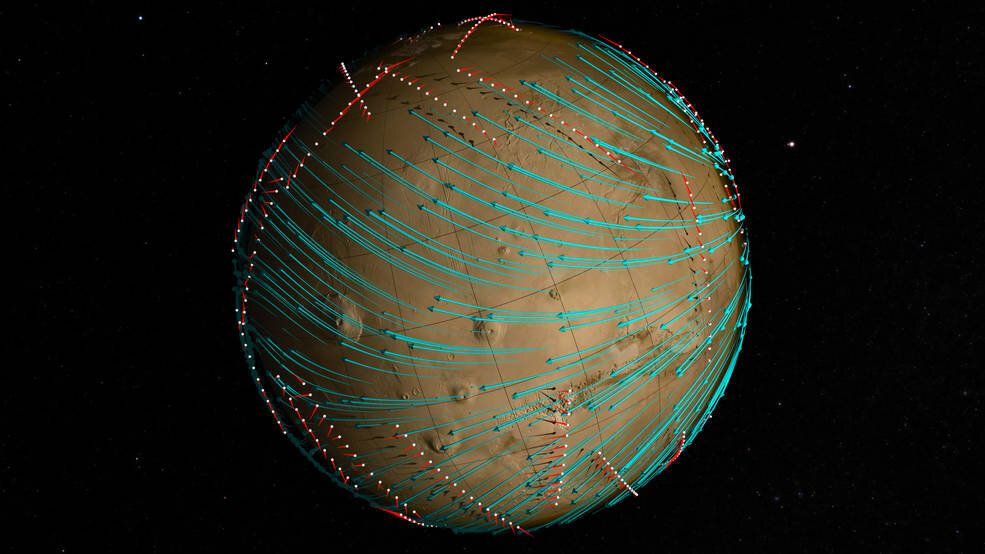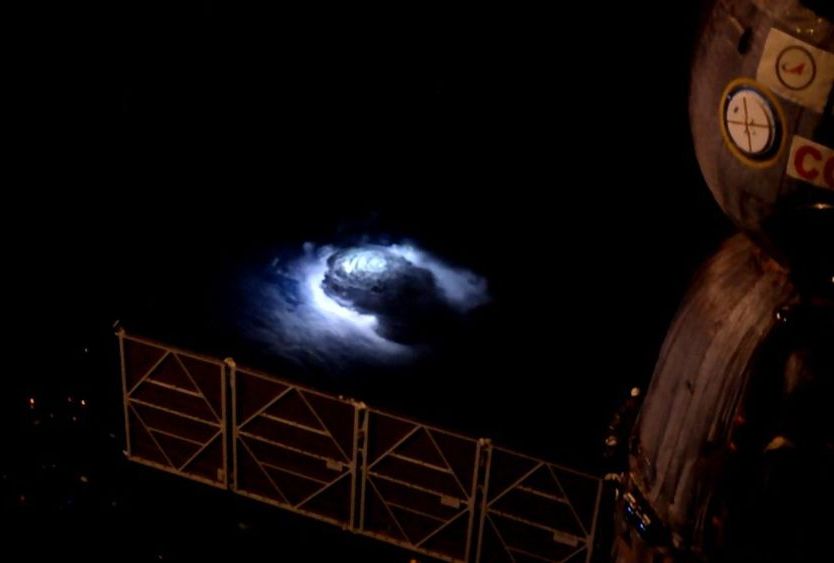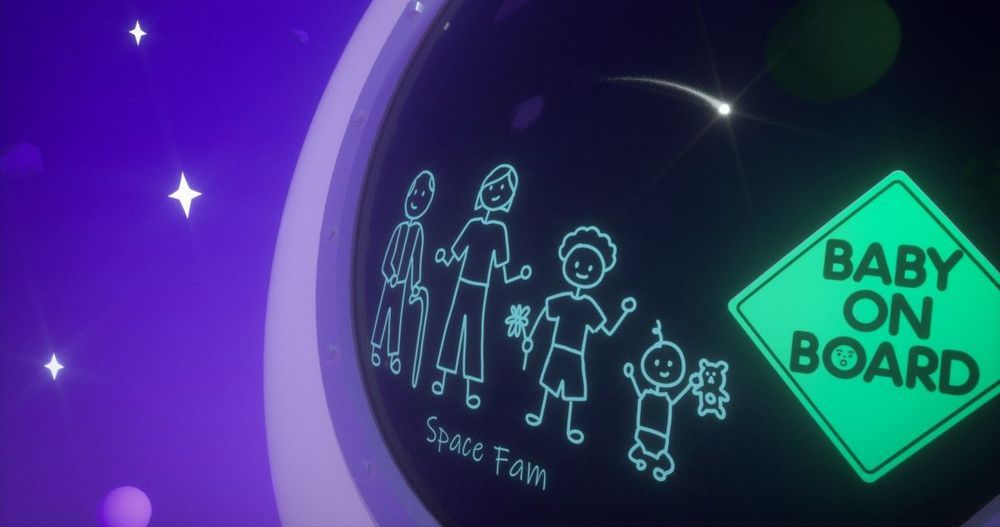Holly Jean Buck is a fellow at UCLA’s Institute of the Environment and Sustainability. This is an adapted excerpt from her upcoming book After Geoengineering: Climate Tragedy, Repair, and Restoration (September 2019, Verso Books).




This terrifying climate ad depicts an apocalyptic U.S.
Via NowThis Politics

Today, a paper published in Science documents for the first time the global wind circulation patterns in the upper atmosphere of a planet, 120 to 300 kilometers above the surface. The findings are based on local observations, rather than indirect measurements, unlike many prior measurements taken on Earth’s upper atmosphere. But it didn’t happen on Earth: it happened on Mars. On top of that, all the data came from an instrument and a spacecraft that weren’t originally designed to collect wind measurements.
In 2016, Mehdi Benna and his colleagues proposed to the Mars Atmosphere and Volatile EvolutioN (MAVEN) project team that they remotely reprogram the MAVEN spacecraft and its Natural Gas and Ion Mass Spectrometer (NGIMS) instrument to do a unique experiment. They wanted to see if parts of the instrument that were normally stationary could “swing back and forth like a windshield wiper fast enough,” to enable the tool to gather a new kind of data.
Initially, the MAVEN project team was reluctant to implement the modifications Benna and his colleagues requested. After all, MAVEN and NGIMS had been orbiting Mars since 2013, and they were working quite well collecting information about the composition of the Mars atmosphere. Why put all that at risk? Benna and his colleagues argued that this project would collect new kinds of data that could shape our understanding of the upper atmosphere on Mars, inform similar studies on Earth, and help us better understand planetary climate.

O…O.
At 8:01 p.m. on October 10, 2018, a bolt of lightning flashed inside of a storm cloud just east of the Indonesian island of Sulawesi. The International Space Station was passing overhead at the time, and a suite of instruments observed as the bolt produced a flash of gamma radiation—and, simultaneously, emitted a glowing ring of ultraviolet and visible light in the topmost layer of the atmosphere.
Scientists today are presenting the results of this observation, the first to capture both a terrestrial gamma ray flash, or TGF, and the visible-light component of an Elve, a dim disk of ionospheric radiation. This observation provides more evidence for the connection between lightning, the radiation produced by storms, and electromagnetic phenomena at the top of the atmosphere, while illustrating more of the wild radioactive curiosities that weather can generate.

VR and Interstellar Travel
Crew members in route to a distant planet may best be accommodated by full immersion VR. The actual spaceship could be reduced to a relatively simple, small, well-shielded vehicle. Inside the crew’s biological material could be supported by a simplified nutrition, waste and maintenance system. Their minds could inhabit a fully immersive VR environment that would provide them with all the luxuries of vast, diverse spaces and experiences — complete with simulated gravity, simulated pleasant nature-like and artificial environments, and simulated meals.
They could also engage in simulating the type of society they intend to build once they arrive in their new physical environment, using similar constraints to the ones they will encounter. This could allow many years for actual human experiences to test and refine what they will build and how they will interact in their new home.
Advances in maintaining biological material may even allow a single generation to survive the entire journey. They may adopt their own conventions for simulating death and birth for reasons related to simulating their new home or for maintaining psychological well-being over many centuries. Simulated death and reincarnation may allow a single crew to experience many childhoods and parenting situations without the need for actual procreation.
Another concern that this addresses is the need for massive funding for research and development as well as resource provisioning when building conventional spacecraft intended to deliver things like artificial gravity, agriculture and pleasant living spaces for large multigenerational populations — all while shielding them from radiation. Funding the development of fully immersive VR seems like a relatively easier to fund activity that has immediate uses here on earth and elsewhere. The types of ships that would be sufficient for sustaining and shielding humans living mostly in immersive VR would be so simplified that most of the fundamental research that would be specific to designing such crafts may have already occurred.
After 200,000 years or so of human existence, climate change threatens to make swathes of our planet unlivable by the end of the century. If we do manage to adapt, on a long enough timeline the Earth will become uninhabitable for other reasons: chance events like a comet strike or supervolcano eruption, or ultimately — if we make it that long — the expansion of the sun into a red giant in around five billion years, engulfing the planet completely or at a minimum scorching away all forms of life. Planning for potential escape routes from Earth is, if not exactly pressing, then at least a necessary response to a plausible threat.

Between the solar wind stripping its atmosphere and these horrific dust towers bleeding its water into space, Mars may not have ever had a chance at a stable climate.
NASA reports that these are the result of observations by NASA’s Mars Reconnaissance Orbiter’s heat-sensing Mars climate sounder instrument which can easily penetrate this dusty haze.
We’re not yet able to understand how much these towers contributed to Mars’ past water loss, David Kass, a planetary scientist at NASA Jet Propulsion laboratory and the Mars Climate Sounder instrument’s principal investigator, told me by phone. But they are telling us that the simple extrapolations that we were doing before to explain Mars’ water loss has limitations, he says.
And even though Mars’ atmosphere is roughly equal to only one percent of Earth’s, Kass said the dust is able to reach high altitudes because it is extremely fine.

New research results show how sound below the range of human hearing can help scientists predict and track tornadoes.
Predicting tornadoes is crucial for saving lives. Today, meteorologists rely on Doppler radar signatures as well as context clues, combined with reports from eyewitnesses on the ground. The technology has led to a major increase in warning time around tornadoes over recent decades. But the National Weather Service still reports at least a 50 percent false alarm rate for issued tornado warnings as of 2014, and the rate might be even higher. Now, scientists are getting serious about using infrasound—sound with a frequency lower than human ears can hear—as a means to supplement present-day methods for tornado detection.